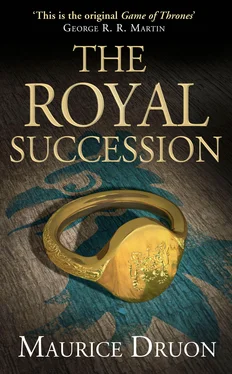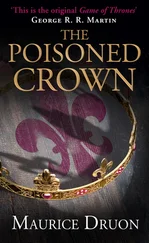Maurice Druon - The Royal Succession
Здесь есть возможность читать онлайн «Maurice Druon - The Royal Succession» — ознакомительный отрывок электронной книги совершенно бесплатно, а после прочтения отрывка купить полную версию. В некоторых случаях можно слушать аудио, скачать через торрент в формате fb2 и присутствует краткое содержание. Жанр: unrecognised, на английском языке. Описание произведения, (предисловие) а так же отзывы посетителей доступны на портале библиотеки ЛибКат.
- Название:The Royal Succession
- Автор:
- Жанр:
- Год:неизвестен
- ISBN:нет данных
- Рейтинг книги:3 / 5. Голосов: 1
-
Избранное:Добавить в избранное
- Отзывы:
-
Ваша оценка:
- 60
- 1
- 2
- 3
- 4
- 5
The Royal Succession: краткое содержание, описание и аннотация
Предлагаем к чтению аннотацию, описание, краткое содержание или предисловие (зависит от того, что написал сам автор книги «The Royal Succession»). Если вы не нашли необходимую информацию о книге — напишите в комментариях, мы постараемся отыскать её.
The Royal Succession — читать онлайн ознакомительный отрывок
Ниже представлен текст книги, разбитый по страницам. Система сохранения места последней прочитанной страницы, позволяет с удобством читать онлайн бесплатно книгу «The Royal Succession», без необходимости каждый раз заново искать на чём Вы остановились. Поставьте закладку, и сможете в любой момент перейти на страницу, на которой закончили чтение.
Интервал:
Закладка:
‘Adam Héron, has no courier arrived from Paris?’ he asked.
‘No, Monseigneur.’
‘Then close all the gates of Lyons.’
4
Let us Dry our Tears
THAT MORNING THE PEOPLE of Lyons were without vegetables. The market-gardeners’ wagons had been stopped outside the walls, and the housewives were clamouring in the empty markets. The only bridge, that over the Saône (for the one over the Rhône had not yet been completed), was barred by soldiery. But if one could not enter Lyons, one could not leave it either. Italian merchants, travellers, itinerant friars, reinforced by loungers and idlers, gathered about the gates and demanded an explanation. The guard invariably replied: ‘The Count of Poitiers’s orders,’ with the distant and important air that agents of authority tend to adopt when executing an order they do not understand.
People were shouting:
‘But my daughter is ill at Fouvière …’
‘My barn at Saint-Just burned down yesterday at vespers …’
‘The bailiff of Villefranche will have me arrested if I don’t take him my poll-tax today …’
‘The Count of Poitiers’s orders!’
And when the crowd began to press forward, the royal sergeants-at-arms raised their maces.
There were strange rumours going round the town.
Some declared that there was going to be war. But with whom? No one could say. Others asserted that a bloody riot had taken place during the night near the Augustinian monastery between the King’s men and those of the Italian Cardinals. Horses had been heard going by. Even the number of the dead was mentioned. But at the Augustinians’ all was quiet.
The Archbishop, Pierre de Savoie, was very anxious, wondering whether the events which had taken place before 1312 were about to begin all over again and whether he would be compelled to abandon, to the advantage of the archbishopric of Sens, the primacy of the Gaules, the only prerogative he had succeeded in preserving when Lyons had been attached to the Crown. 6He had sent one of his canons for news; but the canon, having gone to the Count of Poitiers’s lodging, had been met by a curtly silent equerry. And now the Archbishop was expecting an ultimatum.
The Cardinals, who were lodged in various religious houses, were no less anxious and, indeed, inclined to panic. Were they to be treated as they had been at Carpentras? But how could they escape this time? Messengers rushed from the Augustinians to the Franciscans and from the Jacobins to the Carthusians. Cardinal Caetani had sent his general assistant, the Abbé Pierre, to Napoléon Orsini, to Albertini de Prato and to Flisco, the only Spaniard, with orders to say to those prelates: ‘Look what has happened! You let yourselves be persuaded by the Count of Poitiers. He swore not to molest us, that we should not even have to go into seclusion to vote, and that we should be completely free. And now he has shut us up in Lyons!’
Duèze himself received the visit of two of his Provençal colleagues, Cardinal de Mandagout and Bérenger Frédol, the elder. But Duèze pretended to have but just emerged from his theological studies and to know nothing. During this time, in a cell near the Cardinal’s apartment, Guccio Baglioni was sleeping like a log, in no state to speculate what might be the cause of all the panic.
For the last hour Messire Varay, Consul of Lyons, 7and three of his colleagues, who had come to ask for an explanation in the name of the City Council, had been kept waiting in the Count of Poitiers’s antechamber.
The Count was sitting in camera with the members of his entourage and the great officers who were part of his delegation.
At last the hangings parted and the Count of Poitiers appeared, followed by his councillors. They all wore the grave expressions of men who had just reached an important political decision.
‘Ah, Messire Varay, you have come at the right moment, and you too, Messires Consuls,’ said the Count of Poitiers. ‘We can give you at once the message we were about to send you. Messire Mille, will you be so good as to read it?’
Mille de Noyers, a jurist, a Councillor of Parliament and Marshal of the East under Philip the Fair, unrolled the parchment and read as follows:
“To all the Bailiffs, Seneschals, and Councils of loyal towns. We would have you know the great sorrow that has befallen us by the death of our well-beloved brother, the King, our Lord Louis X, whom God has removed from the affection of his subjects. But human nature is such that no one may outlive the term assigned him. Thus we have decided to dry our tears, to pray with you to Christ for his soul, and to show ourselves assiduous for the government of the Kingdom of France and the Kingdom of Navarre that their rights may not perish, and that the subjects of these two kingdoms may live happily beneath the buckler of justice and of peace.
“The Regent of the two Kingdoms, by the Grace of God.
PHILIPPE”
When they had recovered from their astonishment, Messire Varay immediately came forward and kissed the Count of Poitiers’s hand; then the other Consuls unhesitatingly followed suit.
The King was dead. The news was so surprising in itself that no one thought, for several minutes at least, of questioning it. In the absence of an heir who was of age, it seemed perfectly normal that the elder of the sovereign’s brothers should assume power. The Consuls did not for a moment doubt that the decision had been taken in Paris by the Chamber of Peers.
‘Have this message cried in the town,’ Philippe of Poitiers ordered; ‘which done, the gates will be immediately opened.’
Then he added: ‘Messire Varay, you hold a great position in the cloth trade; I should be glad if you would furnish me with twenty black cloaks which may be placed in the antechamber to clothe those who come to condole with me.’
He then dismissed the Consuls.
The two first acts of his seizure of power had been accomplished. He had been proclaimed Regent by his entourage, who became thereby his Council of Government. He would be recognized by the City of Lyons in which he was staying. He was now in a hurry to extend this recognition over the whole kingdom and thus place the accomplished fact before Paris. It was a question of speed.
Already the copyists were reproducing his proclamation in considerable quantities, and the couriers were saddling their horses to ride with it into every province.
As soon as the gates of Lyons were opened, they hastily set out, passing three couriers who had been kept on the other side of the Saône since morning. The first of them carried a letter from the Count of Valois, announcing himself as the Regent appointed by the Council of the Crown, and asking Philippe to agree, so that the appointment might become effective. ‘I am sure that you will wish to help me in my task for the good of the kingdom, and will give me your agreement as soon as possible, like the good and well-beloved nephew you are.’
The second message came from the Duke of Burgundy, who also claimed the regency in the name of his niece, the little Jeanne of Navarre.
Finally, the Count of Evreux informed Philippe of Poitiers that the peers had not sat in accordance with custom and precedent, and that Charles of Valois’s haste to seize the reins of government was supported by no legal document or assembly.
The Count of Poitiers had immediately gone into council again with his entourage. It was composed of men who were hostile to the policies pursued by the Hutin and the Count of Valois during the last eighteen months. In the first place, there was the Constable of France, Gaucher de Châtillon, Commander of the Armies since 1302, who could not forgive the ridiculous campaign of the ‘Muddy Army’ which he had been compelled to conduct in Flanders the preceding summer. Then there was his brother-in-law, Mille de Noyers, who shared his feelings. Then, the jurist Raoul de Presles who, after rendering so many services to the Iron King, had had his goods confiscated, while his friend Enguerrand de Marigny had been hanged and he himself had been put to the question by water though no confession had been extracted from him; as a result, he suffered from permanent stomach-pains and bore the ex-Emperor of Constantinople a considerable grudge. He owed his safety and his return to favour to the Count of Poitiers.
Читать дальшеИнтервал:
Закладка:
Похожие книги на «The Royal Succession»
Представляем Вашему вниманию похожие книги на «The Royal Succession» списком для выбора. Мы отобрали схожую по названию и смыслу литературу в надежде предоставить читателям больше вариантов отыскать новые, интересные, ещё непрочитанные произведения.
Обсуждение, отзывы о книге «The Royal Succession» и просто собственные мнения читателей. Оставьте ваши комментарии, напишите, что Вы думаете о произведении, его смысле или главных героях. Укажите что конкретно понравилось, а что нет, и почему Вы так считаете.












